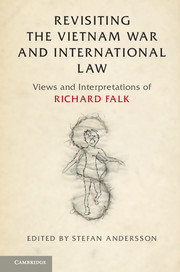Preface
Published online by Cambridge University Press: 28 December 2017
Summary
When I contacted Richard Falk six years ago regarding a collection of his writings on the Vietnam War and international law, I did not know that he had a special relationship to Sweden. He had been invited by Peter Wallensteen who – from 1985 to 2012 – was Dag Hammarskjöld Professor of Peace and Conflict Research at Uppsala University to be Visiting Olof Palme Professor for the academic year 1990–91, which, according to Professor Wallensteen, turned out to be a very successful appointment, not least for the doctoral students and the young researchers.
According to Said Mahmoudi, who is now Professor of International Law at Stockholm University, Falk became a good friend and participated in the academic as well as the general cultural and political discussion in Sweden. Professor Mahmoudi responded to an e-mail regarding Falk's status as an international law scholar in Sweden and wrote that Falk
held several important seminars and lectures during his stay in Stockholm. His time here coincided with the American invasion of Kuwait to push back Saddam Hussein. He gave a talk on the subject, which was very well received. I don't think he is unknown in Sweden. He published several important articles in DN [Dagens Nyheter] at that time. Among those Swedes who deal with international law, international relations and political science, he is a very well-known scholar. Even internationally, he is respected as one of the most leading living American international lawyers. He was a student and friend of the famous Yale international law professor Myers S. McDougal, but one of the very few who took a critical approach to the dominant power-inspired American policy in the world.
A testimony of the appreciation of Falk's merits is that he was awarded an honorary doctorate from the Faculty of Law at Stockholm University in 2006.
However, Falk's contacts with Sweden go further back. Already in 1985 he had been consulted and thanked by Ann-Sofie Nilsson, who spent that year as a Visiting Fellow at the Center of International Studies at Princeton University, for his “valuable suggestions” to her doctoral thesis “Political Uses of International Law” in political science at the University of Lund in 1987.
- Type
- Chapter
- Information
- Revisiting the Vietnam War and International LawViews and Interpretations of Richard Falk, pp. xix - xxviiiPublisher: Cambridge University PressPrint publication year: 2017

